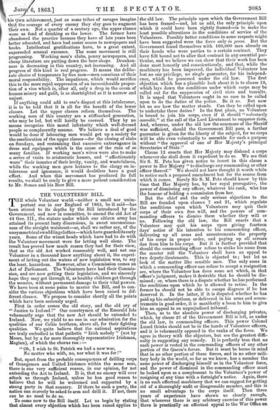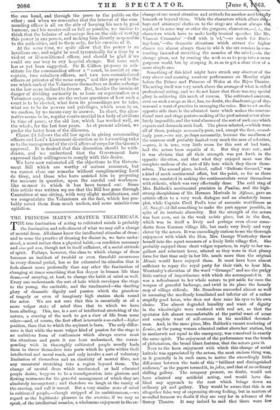THE VOLUNTEERS' BILL. T HE whole Volunteer world--neither a small nor
unim- portant one in our England of 1863, be it said—has been stirred to its depths by the Bill introduced by the Government, and now in committee, to amend the old Act of 44 Geo. III., the statute under which our citizen army has attained its present lusty dimensions, in sweet unconscious- ness of the straight waistcoat—or, shall we rather say, of the unsymmetrical swaddling clothes—which have guarded its early leers. Some of the wisest heads which have had to do with the Volunteer movement were for letting well alone. The result has proved how much reason they had for their view, that as the old Act worked reasonably well, and not one Volunteer in a thousand knew anything about it, the experi- ment of letting out the waters of new legislation was, to say the least, hazardous. However, after a Commission comes an Act of Parliament. The Volunteers have had their Commis- sion, and are now getting their legislation, and we sincerely hope they may get through it, as healthy children get through the measles, without permanent damage to their vital powers. We have been at some pains to master the Bill, and to con- sider the various objections which have been raised to dif- ferent clauses. We propose to consider shortly all the points which have been seriously urged.
First in order comes the old story, and the old cry of ." Justice to Ireland!" Our countrymen of the Emerald Isle vehemently urge that the new Act should be extended to Ireland. Now, we yield to no one in our admiration for the qualities of our Celtic brethren, above all, for their fighting qualities. We quite believe that the national aspirations are truly embodied in that pathetic "Irish melody" (not by Moore, but by a far more thoroughly representative Irishman, Maginn), of which the chorus ran :— " Oh, I wish to St. Patrick we had a new war, No matter who with, no, nor what it was for !"
But, apart from the probable consequences of drilling corps of Orangemen and United Irishmen within the same seas, there-is one very sufficient reason, in our opinion, for not extending the Act to Ireland. It is, that no enemy will ever attack us through Ireland, unless he has good reason to believe that he will be welcomed and supported by a strong party in that country. If there be such a party, the nation can scarcely be asked to arm and drill it. If not, there can be no need to do so.
To come now to the Bill itself. Let us begin by stating that almost every objection which has been raised applies to the old law. The principle upon which the Government Bill has been framed—and, let us add, the only principle upon which it could have been rightly framed—is to make the least possible alterations in the conditions of service of the Volunteers. Possibly better conditions in some respects might have been suggested were the force only in posse. But the Government found themselves with 160,000 men already on their hands who were parties to a certain contract. They have felt bound not to alter that contract in any essential par- ticular, and we believe we can show that their work has been done most honestly and conscientiously, and that, while the machinery has been improved, the individual Volunteer has lost no one privilege, no single guarantee, for his independ- ence, which he possessed under the old law. The first objection which has a plausible look about it is to clause 19, which lays down the conditions under which corps may be called out for the suppression of civil riots and tumults. It is urged that Volunteers ought in no case to be called upon to do the duties of the police. Be it so. But now let us see how the matter stands. Can they be called upon to undertake these duties ? In the first place, no Volunteer is bound to join his corps, even if it should "voluntarily assemble," at the call of the Lord Lieutenant to suppress riots. And, whereas, under the old law the summons of the Sheriff was sufficient, should the Government Bill pass, a further guarantee is given for the liberty of the subject, for no corps will be able even voluntarily to assemble for such a purpose without "the approval of one of Her Majesty's principal Secretaries of State."
Clause 12 enacts that Her Majesty may disband a corps whenever she shall deem it expedient to do so. We see that Sir S. M. Pete has given notice to insert in this clause a power to Her Majesty "to discharge any commanding or other officer thereof." We should not have thought it worth while to notice such a proposed amendment but for the source from which it comes. Surely Sir S. M. Pete should know by this time that Her Majesty has, by her royal prerogative, the power of dismissing any officer, whatever his rank, who has the honour of holding a commission (rom her. But the chief and the only serious objections to the Bill are founded upon clauses 7 and 21, which regulate the conditions upon which Volunteers may quit their corps of their own free will, and the powers of com- manding officers to dismiss them whether they will or no. Following the old law, the Bill enacts that a Volunteer may quit his corps upon giving fourteen days' notice of his intention to his commanding officer, delivering up all arms and accoutrements the property of his corps in proper order, and paying up all arrears due from him to his corps. But it is further provided that should the commanding officer refuse to strike his name from the muster roll the Volunteer shall have an appeal to two deputy-lieutenants. This is objected to ; but let us look at the matter like sensible men. The only cases in which a commanding officer can refuse to accept a resignation are, where the Volunteer has done some act which, in that officer's judgment, makes it desirable that he should be dis- missed; or, where there is a dispute whether he has performed the conditions upon which he is allowed to retire. In the former he should not be able to escape disgrace if he has deserved it. In the latter, if it is disputed whether he has paid up his subscriptions, or delivered in his arms and accou- trements in good order, it is manifestly a boon to him to give him an appeal to an unprejudiced tribunal. Then, as to the absolute power of discharging privates, which, by clause 21 of the Government Bill is left, as under the old law, in commanding officers. This power Colonel Lund thinks should not be in the hands of Volunteer officers, and it is vehemently opposed in the ranks of the force. We agree in theory with the objectors, but see the greatest diffi- culty in suggesting any remedy. It is perfectly true that no such power is vested in the commanding officers of any other portion of the Queen's forces. But it must be borne in mind that in no other portion of these forces, and in no other mili- tary body in the world, so far as we know, has a member the same power of discharging himself as in the Volunteer force, and the power of dismissal in the commanding officer must be looked upon as a complement to the Volunteer's power of resigning at any time with a fortnight's notice. Again, there is no such effectual machinery that we can suggest for getting rid of a thoroughly unfit or disagreeable member, and this is no small advantage to the corps itself. Then three years of experience have shown us clearly enough, that wherever there is any arbitrary exercise of this power there is practically an effectual appeal to the War Office on the one hand, and through, the press to the public on the other ; and when we remember that the interest of the com- manding officer is all on the side of keeping his men in good humour, and his muster-roll as full as possible, we incline to think that the balance of advantage lies on the side of vesting this power in one person, and making him directly responsible to the authorities, and to them only, for his exercise of it.
At the same time, we quite allow that the power is an invidious one, and might be used tyrannically for a time by a violent or ill-conditioned officer, and should be glad if we could see our way to any hopeful change. But none such has as yet been suggested. Sir R. Clifton proposes to sub- stitute for the commanding officer a "court, to consist of one captain, two subaltern officers, and two non-commissioned officers or privates of the same corps," and this propasal is the one which such of the Volunteers themselves as desire a change in the law seem inclined to favour. But, besides the imminent danger of dividing authority in so loose an organization as a Volunteer corps, there are the serious questions of how such a court is to be elected, what form its proceedings are to take, what are to be its powers and privileges, which seem to us, we confess, by no means easy to answer. In short, the alter- native seems to be, regular courts-martial in a body of civilians in time of peace, or the old law, which has worked well, on the whole, for the last four years. As at present advised, we prefer the latter horn of the dilemma. Clause 24 follows the old law again in giving commanding officers and Lord's Lieutenant discretion as to forwarding rules as to the management of the civil affairs of corps for the Queen's approval. It is desired that this discretion should be with- drawn, and we understand that the Government have expressed their willingness to comply with this desire.
We have now exhausted all the objections to the Govern- ment Bill which are worthy of serious comment, but we cannot close our remarks without complimenting Lord de Grey, and those who have assisted him in preparing the measure in question, upon the careful and workman- like manner in which it has been turned out.. Since this article was written we see that the Bill has gone through Committee at one sitting, with very slight modifications, and we congratulate the 'Volunteers on the fact, which has pro- bably saved them from much useless, and some mischievous agitation.































 Previous page
Previous page